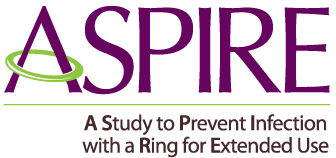
Primary Objectives
- Determine the effectiveness of dapivirine (25 mg) administered in a silicone elastomer matrix vaginal ring (VR), when inserted once every 4 weeks, in preventing HIV-1 infection among healthy sexually active HIV-uninfected women
- Assess the safety of dapivirine (25 mg) administered in a silicone elastomer matrix VR compared to placebo VR, when inserted once every 4 weeks over the investigational product use period
Study Summary
Use of a VR to provide sustained delivery of microbicides is a novel investigational method for prevention of heterosexual transmission of HIV in women. This drug delivery method may circumvent potential difficulties related to adherence to daily or coitally-dependent uses of microbicide regimens.
MTN-020 (ASPIRE) was a Phase 3, multi-site, randomized, double-blind, placebo-controlled clinical trial designed to evaluate the safety and efficacy of the dapivirine VR (25 mg) for the prevention of HIV-1 infection in healthy, sexually active, HIV-negative women. The study enrolled 2,629 participants who were randomized to receive either the 25 mg dapivirine VR or a placebo VR. Participants used the investigational VRs until 120 events (HIV-1 seroconversions) were observed in the trial. It was anticipated that participants would use the study product for a minimum of 12 months. Following VR use discontinuation, participants had an additional 4 weeks of follow-up to identify HIV-1 seroconversions not detected during the product-use period.
MTN-020 completed follow-up on June 25, 2015. Primary results were presented at the annual Conference on Retroviruses and Opportunistic Infections (CROI), February 22-25, 2016, in Boston, MA. The primary manuscript was published in the New England Journal of Medicine on February 22, 2016. A total of 41 papers have been published from this study. Secondary manuscripts development is ongoing.
Primary Results
Participants attended 91% of scheduled study visits and 97% after accounting for early withdrawals from the study. Results of ASPIRE demonstrated that the monthly dapivirine vaginal ring was safe and effective for HIV prevention. There were no statistically significant differences in the frequency of the primary safety endpoints between the study arms, and incident sexually transmitted infections occurred at a similar rate in the two study arms. A total of 168 incident HIV-1 infections occurred during the product use period: 71 in the dapivirine ring arm and 97 in the placebo arm, indicating a 27% relative reduction in the rate of HIV-1 acquisition due to the dapivirine vaginal ring (95% confidence interval [CI] 1-46%, p=0.05). In as-randomized subgroup analyses, HIV-1 protection was generally similar to that seen overall. However, HIV-1 protection differed significantly by age, with women ≥25 years of age demonstrating 61% HIV-1 protection (95% CI 32-77%, p<0.001) while those <25 years of age had no statistically significant reduction in HIV-1 incidence (10% HIV-1 protection effectiveness, 95% CI -41-43%, p=0.64). Further analyses found that lack of HIV-1 protection, along with lower adherence, was limited to those ≤21 years of age; for those >21 years of age, HIV-1 protection effectiveness was 56% (95%CI 31-71%, p<0.001). The rate of adverse medical events was similar between study arms as was the frequency of antiretroviral resistance in those who acquired HIV-1. In summary, a monthly vaginal ring containing dapivirine provided protection against HIV-1 in African women; HIV-1 protection was greater in subgroups with evidence of better adherence to ring use.
US National Institutes of Health
Phase 3, multi-site, two-arm, randomized (1:1), double-blind, placebo controlled trial
